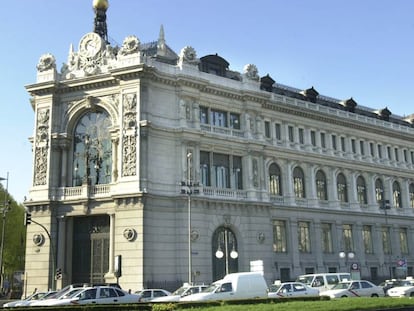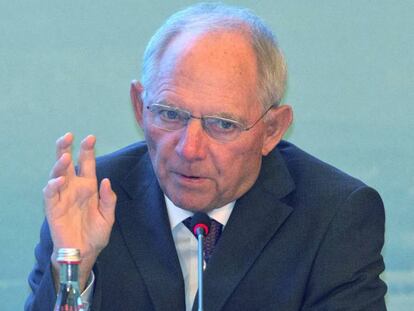Bank of Spain says €26bn of bailout will never be recovered
Authorities acted too late in response to collapse of banking system, say experts


After acknowledging last week that just 5% of the €51.3 billion spent on Spain’s banking bailout over the last seven years has been recovered, the Bank of Spain has now admitted that €26.3 billion in state aid to the country’s banks will never be clawed back, despite promising voters in 2012 that they would not foot the bill for the financial crisis.
What’s more, a further €11.7 billion paid out by the banks themselves will never be recovered. In short, €38 billion that was flushed into the banking system has gone forever.
To put that figure – which represents 2.6% of GDP – in context, over the last five years, the government has cut education and health spending by €16 billion.
This is a loan to the banks and the banks will pay it back Prime Minister Mariano Rajoy
So far, no official figures have been released about how much money has been spent on restructuring Spain’s savings banks. Bankia, the former Caja Madrid, has cost taxpayers €22.4 billion in an effort prepare it for sale, but financial analysts say it is unlikely that the full cost will ever be recovered.
Antoni Garrido, an Applied Economics professor at the University of Barcelona, blames the failure to recover money from the banks on the impact of the collapse of the construction sector. “This was where almost all lending and investment went, generating huge losses within the financial system,” he says. He also points to “delays in attacking solvency problems, which made the situation worse, because doubts about the reality of the situation worsened the economy.”
Aristóbulo de Juan, a former general director at the Bank of Spain, agrees. “Acting so late certainly increased the losses to many savings banks and the cost of cleaning them up,” he explains. “The initial diagnoses regarding the savings banks were extremely optimistic and their subsequent treatment was clearly insufficient. By 2012, four or five years after the crisis kicked in and they were recapitalized with real money and the Sareb [the so-called toxic bank] was set up, the underlying losses had already multiplied. The problem is also that the Sareb had to acquire bad assets at very unrealistic prices, leaving part of the losses in the recapitalized banks and the rest in the Sareb.”
Rafael Hurtado, a lecturer at CUNEF, a business school linked to Madrid’s Complutense University, adds that Spain’s banks have performed poorly over the last eight years: “The economic environment and low interest rates in Spain have not allowed for adequate returns and this has impacted on the evaluation of the entities.”
But De Juan disagrees: “The reason earnings are so low is that the bulk of recapitalization has been spent on filling the financial black hole rather than on helping the banks stay afloat.” He is pessimistic about recovering much of the money spent on the bank bailout, instead foreseeing what he sees as a “drip effect” from the sale of shares from the FROB, or Orderly Bank Restructuring Fund, dividends and corporate tax. He points out that money from the Guarantee Fund will never be recovered.
“The obstacles placed by the authorities in the way of interested parties in acquiring these entities in crisis, such as foreign banks and aggressive investment funds, reduced the number of potential buyers and thus the prices being offered,” he says.
Over the last five years, the government has cut education and health spending by €16 billion
The Bank of Spain says it expects to recover a further €2.3 billion from the €51.3 billion spent on bailing out the banks. A veteran from Spain’s banking sector who asks to remain anonymous, sums up the situation: “Don’t expect any good news. The banks have lost half of their value and will take years to recover.”
In June 2012, when the Spanish government announced its rescue plan for the country’s crippled banking system, in part funded by the European Central Bank, Economy Minister Luis de Guindos told Congress: “Have no doubt that most of the money going to the nationalization of these banks will be recovered. The loan will not be paid for by society, on the contrary.” The same day, Prime Minister Mariano Rajoy insisted: “This is a loan to the banks and the banks will pay it back.” A few weeks later, Deputy Prime Minister Soraya Sáenz de Santamaría reiterated the government’s line, insisting: “We have organized this bank rescue so that it doesn’t cost taxpayers a single euro.”
English version by Nick Lyne.
Tu suscripción se está usando en otro dispositivo
¿Quieres añadir otro usuario a tu suscripción?
Si continúas leyendo en este dispositivo, no se podrá leer en el otro.
FlechaTu suscripción se está usando en otro dispositivo y solo puedes acceder a EL PAÍS desde un dispositivo a la vez.
Si quieres compartir tu cuenta, cambia tu suscripción a la modalidad Premium, así podrás añadir otro usuario. Cada uno accederá con su propia cuenta de email, lo que os permitirá personalizar vuestra experiencia en EL PAÍS.
En el caso de no saber quién está usando tu cuenta, te recomendamos cambiar tu contraseña aquí.
Si decides continuar compartiendo tu cuenta, este mensaje se mostrará en tu dispositivo y en el de la otra persona que está usando tu cuenta de forma indefinida, afectando a tu experiencia de lectura. Puedes consultar aquí los términos y condiciones de la suscripción digital.










































